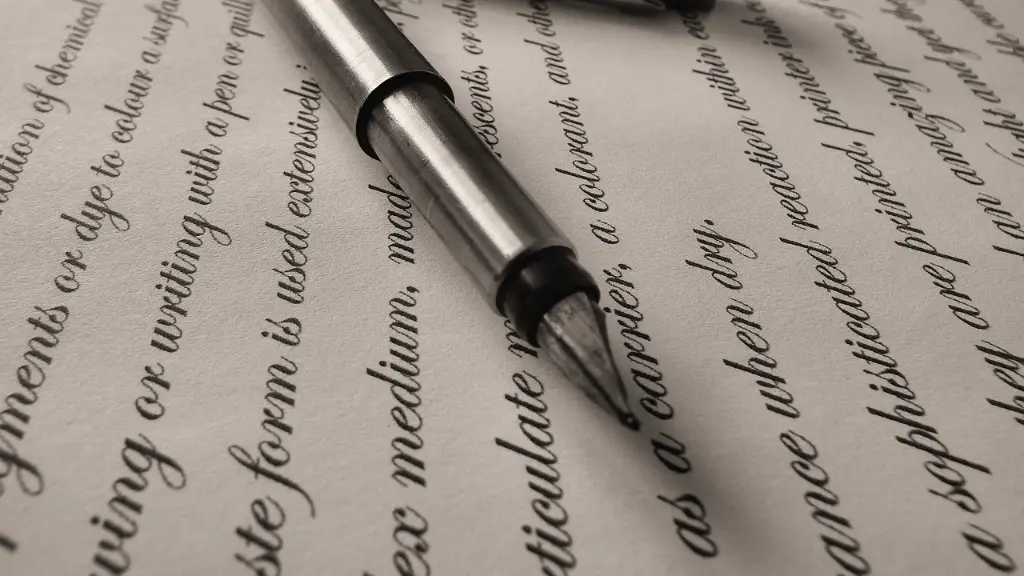Poetry is one of the world’s most beloved forms of expression. It is a captivating literary form that has been used to touch hearts, deepen emotions, and express stories for centuries. But why do people gravitate towards poetry? In this article, we explore the power of poetry, digging into it’s psychological and emotional benefits, examining why readers enjoy it and what draws them to it.
A key part of the appeal of poetry is that it offers an escape from the mundane, everyday world into a realm of intense pleasure. It is an opportunity for its reader to dive into an alternate world — a beautiful, surreal place full of emotion and possibility. When reading poetry, life can simply become a never-ending source of pleasure.
In addition to providing an escape, poetry also offers a powerful psychological and emotional release. Poetry allows us to express our emotions in ways that are otherwise impossible, enabling us to explore and express intimate feelings, thoughts and experiences in a safe yet profound way. It gives words to emotions that may otherwise not have been expressed. As a result, it allows us to tap into our deepest emotions and understand the emotions of others.
In addition to its psychological and emotional benefits, poetry also has the scientifically-proven ability to reduce stress. Studies have found that reading poems aloud can lower a person’s stress levels and improve their overall wellbeing. The power of poetic words allows us to relax, clear our heads and think more positively. This can help us to manage stressful situations and to restore balance in our lives.
Poetry is also an art form that can deeply move its reader. It is powerful, immersive and often speaks to us in a way that no other form of literature can. The beauty of a poem — the rhythm and flow of the words, the imagery and symbolism — have the power to make us feel a range of emotions from joy and excitement to sadness and despair. They can take us to far off places, allowing us to drift away in our imaginations for an hour or two. And in doing so, explore ourselves and the world in ways that might have previously felt impossible.
In addition to its emotive power, poetry also appeals to readers due to its inherent linguistic features. A poem’s cadence, rhyme, syntax and diction are all highly crafted, making it a delight to read, analyze and enjoy. Poetry can be immensely creative and often challenging, making it an interesting read no matter the reader’s background.
Ultimately, poetry is a beloved art form because it can provide solace, offer insight and be a source of pleasure. With its unique ability to stir up emotion and provide an escape, it is no wonder why so many people are drawn to it. For those reasons and many more, poetry continues to be a treasured form of literature.
Ratio and Timelessness
The ratio of poetry has been a treasured aspect for many poets and readers alike. Great works of poetry are generally written in traditional structures and forms, such as sonnets, ballads and odes. Being able to express feelings and thoughts through the use of metre, rhythm, rhyme and stanza has not only encouraged poets to step out of the box and think differently, but also encouraged readers to appreciate timeless works of poetry.
The great thing about these common forms of poem is that they become timeless pieces, allowing readers to continuously appreciate the poetry composed centuries ago, in our modern day. They are still enjoyed and will continue to be, long after our lives. This notion of timelessness within the ratio and styles of poetry, allows us to step out of our commonplace and appreciate the art, regardless of when it was composed.
The genre of ratio allows for a reader to truly demonstrate the emotion and depth of a poem. Whether it be rhythm or rhyme, the structure of a poem allows for the reader to analyse a poem and appreciate each part, establishing the unique and captivating qualities of a work of art, being it is completely different from a prose.
These conventions that have been established centuries ago, still remain and continue to captivate millions of people today. Poets continually abide by the rules of ratio and create unique and timeless works, allowing them to make a distinct impression and making them more memorable.
The Ambiguity
One of the main appeals of poetry lies in its ambiguity and lack of distinct meaning. There is no one answer when it comes to understanding the depths of a poem, yet this is its beauty. Rather than telling readers what to feel, poetry allows them to draw their own emotions. Instead of providing a certain answer, it instead gives readers insights that may not have been previously known and allows for a deeper understanding of the poem.
When it comes to poetry, readers have the ability to create their own conclusion. They can read the same poem many times and develop different emotional responses with each new reading. This appeal of the non-specific allows readers to read a poem once more and think of something that they never thought of before. This type of exploration encourages curiosity, while allowing readers to appreciate the creative interpretations of a work of art.
The lack of definite meanings also allows poetry to be interpreted by different readers. As some poets are extremely vague with their words and metaphors, readers can come up with individual Stories, based on what triggers them. Depending on their life experiences and upbringing, readers can interpret works of poetry differently, and almost personalise them, making them feel as though the poem was written for them, in particular.
Moreover, the level of detail found within a poem and the ability to word a particular emotion, allows readers to relate to the emotions of the poem, in a very distinct and personal way. This is particularly attractive to readers, as they are able to develop a new and deeper understanding of their own feelings and emotions, based on the interpretations of another.
The Cultural Role
The role of culture, when it comes to poetry, is an undeniable factor in its appeal. Poetry is deeply intertwined with the culture of its society, as it reveals the unique values and characteristics of a time and place. It is for this reason that some poems can have a lasting and universal relevance, as certain topics remain applicable, no matter the time or place. As with any art form, it is appreciated differently based on the culture and context in which it is read.
Due to its flexibility, poetry can be used to reflect political, social or religious views. Its ability to tell stories with words has the potential to create a pivotal cultural shift. Although this is not its primary role, renowned poets have proven to be some influential figures in history. Moreover, with its complexity and detailed craftsmanship, it can evoke different themes and perspectives that can evoke a more powerful significance to its readers.
Poetry has always been a vital part of cultures and societies all around the world. It has been used to document and celebrate events, as well as to voice and express the feelings and values of different communities. As well as this, the ability to write a particular emotion in its purest form is unique to poetry and has become a staple in any culture.
No matter the culture or context, the main purpose of poetry remains the same: to help people communicate their feelings and provide insight into our lives. By using emotional language and metaphors, poems can allow us to experience a range of emotions that may otherwise remain unknown.
The Audience
Simply put, one of the main reasons why people love poetry is because it has an audience. Poetry is a form of expression that has the ability to captivate thousands of readers and make them feel something. It celebrates the intricacies of language and has the power to move its readers and listeners. By being able to connect with its audience, poets can create beautiful works of art that can be appreciated for generations.
Apollo, the god of music and the arts, is an ideal representation of many great poets and their admirers. When listening to his voice, his audience would be emotionally moved and inspired by the power of his words. The same is said for renowned poets, whose works still have an effect on their readers, long after its creation.
This audience can be found virtually anywhere nowadays. Although it is still appreciated in an individual form, the development of technology has only made poetry more accessible to the public. With the power of the internet, people all over the world can connect with the world of poetry and discover works they never knew existed, while expressing their own poems through the same platform.
In conclusion, poetry is an immensely popular form of expression due to its unique features. It provides a unique escape, allows for powerful psychological and emotional releases, has the ability to reduce stress, is timeless and can evoke emotion. It is also an art form with an audience, which brings people together and allows them to connect with its allure. The vast array of features, benefits and celebration of expressions makes poetry an irresistible form of art.





